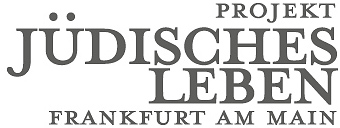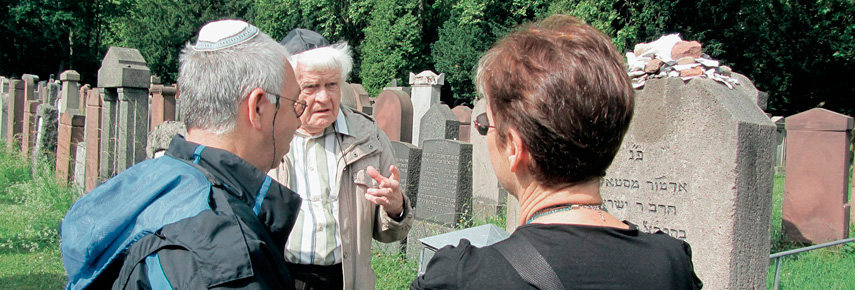Fear remains which was transferred from my mother to me and which I have been fighting against all my life. Gratefulness remains for those people who were courageous enough to hide us. Remembrance remains of the noises caused by the bomb-attacks and the smell of burning houses.
Up to now the imagination of how my grandparents, my aunt and my uncle were deported and lost their lives will never get out of my mind. My father never mentioned anything to me. Perhaps he wanted to save me from discrimination being called a ”Jewish bastard“. As my mother had already died in 1948, I had no opportunity of talking to her.
At the age of 50 years, I started my own investigations. I accompanied a group of teachers to Auschwitz. This journey gave me a kind of relief and made an end to my nightmares. I faced reality and was able then to begin to look for my family story.
For a long time it was not known where my grandparents, my uncle and my aunt were deported to. Latest researches found out that they were transported to Izbica first and then to Sobibor and Belcec (Poland).
In honour of my grandparents, my uncle and my aunt, I travelled to Izbica, Sobibor and Belcec. I was deeply moved how long the journey was. How much must they have suffered?
For me it is important what happened after 1945. In Bielefeld – the town where I was born – a room in a house was rented and a little synagogue installed by Jewish survivors. Slowly people coming back from the concentration-camps gathered there and founded a small Jewish congregation. My aunts – as I called them – coddled me a lot because I was one of the few children who had survived. The majority of the survivors who came back were on their transit to the U.S.A. or to Palestine.
When I was with them, they never talked about their experiences. After the death of my mother I lost contact with the congregation.
My early childhood influenced me a lot. Perhaps that is why I became a teacher and a psychologist to tell my descendants to be aware of people – especially politicians – who promise a lot: Be aware, check and think! INHUMANITY MUST NOT HAPPEN AGAIN!
I think as one of the one-and-a-half generation, I too am a witness of the NS-regime even if the term “authentic” may not be quite appropriate.
The life of my cousin Ruth has been totally different from mine. I think she belongs to the one-and-a-half generation, too. She was born in Palestine and grew up there. She is not an authentic witness of the Nazi-time here in Germany, of course. Her father, the eldest brother of my mother, emigrated from Germany in 1933. Born in 1939, Ruth experienced as a child the formation of the state of Israel and the daily struggle of her parents for a living there. Her parents did not tell her much about her German families. She was told about the shoa only in school or by German immigrants who were able to talk about their experiences. I think she had a better childhood than I had.
In the following years she and her husband had political contacts to their twin-towns Mainz and Bremen, also a step towards her reconciliation with the shoa. The visit to Frankfurt in 2012 allowed her a deeper view into our family story.
Both of us do belong to the one-and-a-half generation but with different life stories. While I experienced the building up of the German Republic she had her experiences in the state of Israel. Nevertheless, we have a lot in common. We are linked by the love of our family who gives us the strength to be able to speak openly in the end.



